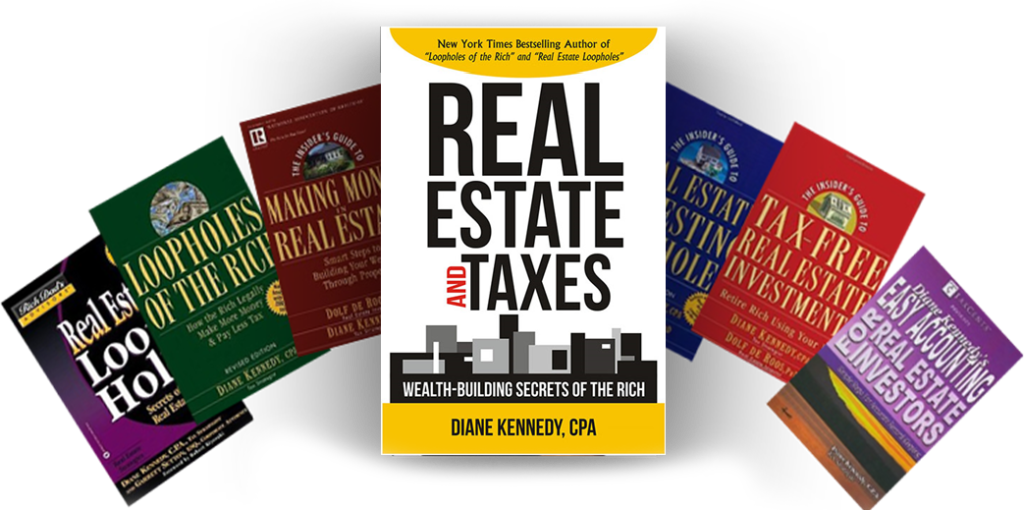This is Why: You can buy and hold rental properties to create streams of passive income that flow into your pocket every month (on which you can legally pay no tax), then sell the property for a gain down the road (on which you can legally pay no tax, again), and in the meantime generate paper losses even if your property appreciates in value and cash flows positive every month (and those “phantom losses” can potentially be taken against other forms of income as a write off).
Not only is it true, it is completely legal and, in fact, all these “real estate tax loopholes” are simply government incentives designed to encourage you to buy and hold rental property. So, this is your reward for doing what the government wants. Nice, huh?
The only “catch” is that you have to first know what these loopholes/incentives are and, secondly, you have to execute them properly (with careful compliance) to ensure you do it all legally and correctly.
Now, the wealthy have extremely well paid CPAs who understand exactly how all of these legal tax loopholes work and who help them maximize every one. We think you should know how they work and be able to maximize them too as they are one of the core benefits of investing in real estate.
Diane Kennedy (born 1956) is an American CPA, speaker, and financial writer. She is the author of The Wall Street Journal and Business Week bestsellers, Loopholes of the Rich and Real Estate Loopholes as well as The Insider’s Guide to Real Estate Investing Loopholes, Tax Loopholes for eBay Sellers, and Smart Business Stupid Business.
Check out the 1 hour webinar below, as Diane pulls back the curtain and shows you how her elite client base are using these and other real estate tax loopholes…and how you can too!
Real estate tax breaks are there for all of us, but you have to be able to afford high-price CPAs and tax attorney to find them. That is until now… WATCH THE WEBINAR.


Property management fees, insurance, repairs (not capital improvements) and property taxes are all deductible.
You can also deduct your Mortgage interest. If you make interest-only payments on your loan, your entire mortgage payment is deductible.
Even if your property is going up in value, the government allows you to ‘depreciate’ it! They do not let you depreciate land however, so you need to break out the cost of the land and then depreciate only the property structure on a 27.5 year straight-line schedule.
Let’s say you buy a new or completely renovated rental property for $325,000. If you determine the land to be worth $50,000, you would subtract that out and that leaves you with $275,000 as the value of your structure, which you can then depreciate over 27.5 years.
So, if you divide $275,000 by 27.5 that comes out to a $10,000 annual "loss" you can take against your income from the property for each of the next 27.5 years. This is referred to as a "phantom loss" because you didn’t actually lose anything. Pretty cool, right?
In addition to the straight line depreciation of your property structure over 27.5 years, there are a number of "personal property" items that you can break out and depreciate on accelerated schedules.
For example, if you have a brand new microwave, stove, flooring, HVAC, etc., in your rental property, these items can be depreciated over a much shorter period (7-15 years) so you can legally take those benefits sooner and have your initial paper "losses" be even greater.
The IRS says that you can take up to $25,000 per year of real estate losses against other forms of income (such as earned income from your job).
Let’s say you make $100,000 per year at your job, and that you were able to accumulate $25,000 of left over "phantom losses" that you could take against that earned income. That would reduce your taxable earned income from $100,000 down to $75,000.
So, if you were in the 28% tax bracket that would be an annual tax savings of $7,000!
Now, your ability to take $25,000 of real estate losses against other forms of income phases out as your income rises from $100,000 to $150,000 and if you make over $150,000, you cannot take any of your real estate losses against your other forms of income, unless you can qualify as a "real estate professional" for tax purposes.
The holy grail of real estate tax benefits is the “Real Estate Professional” status.
The IRS is making it tougher to qualify, so make sure you are working with a qualified CPA to ensure you have proper documentation if you want to try.
These are the benefits:
Qualifications include spending at least 750 hours a year (15 hours a week) on qualifying real estate activity, and spending more time on real estate than any other job. But there are important “material participation” and other requirements that you must meet as well. It is important to always consult with a qualified CPA to ensure that you meet and document all the requirements properly.
A "1031" or "Like Kind Exchange" allows you put all of the proceeds from the sale of your property into buying another "like-kind" property (or properties) of equal or greater value. You can "exchange" properties without triggering the capital gains tax and depreciation recapture that would normally be due on sale.
The amazing thing is that the government allows you to continue to exchange and exchange and exchange for your entire life and then, at death, the deferred depreciation recapture and capital gains are both automatically wiped out when your heirs inherit the property!
There are important formalities and compliance requirements for executing a 1031 exchange (including the use of a Qualified Intermediary) and timeframes that you must adhere to, so be sure you are working with a professional to execute the 1031 Exchange transaction properly.

With Diane Kennedy
You should assume that Maverick Investor Group, LLC has an affiliate relationship and/or another material connection to all suppliers of goods and services mentioned here and will be compensated for showing advertisements, recommending products or services, or linking to the supplier's website. You should assume that all links here are affiliate links and that Maverick Investor Group, LLC will be compensated for anything you purchase through those links.
Click on a category and see all of our educational resources available for you:
GET Access TO Private buying opportunities for TURNKEY Rental properies & EDUCATIONAL RESOURCES. READ OUR PRIVACY NOTICE & TERMS OF USE.
